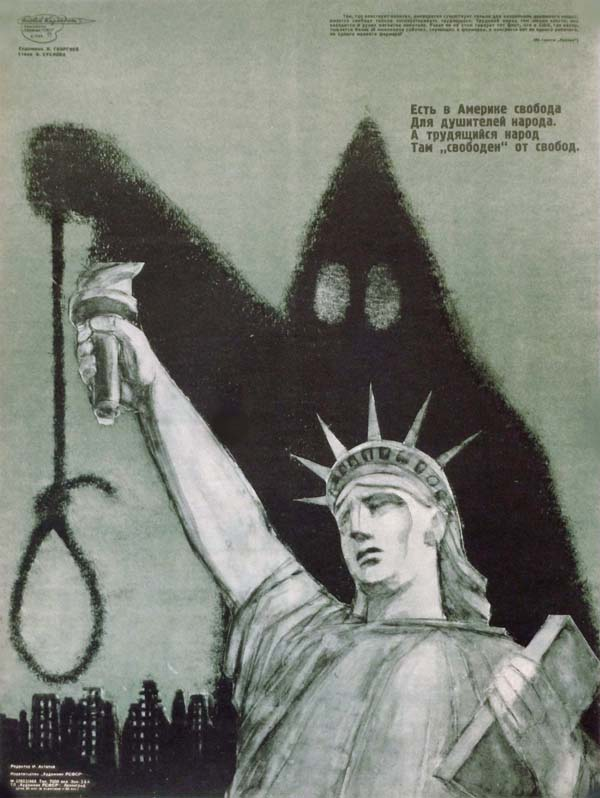(Liberal opposition to freedom) Tag: Visual edit |
No edit summary Tag: Visual edit |
||
| Line 1: | Line 1: | ||
[[File:There is freedom in America poster.png|thumb|"There is freedom in [[United States of America|America]] for the [[Ku Klux Klan|stranglers]] [[Police|of]] [[Federal Bureau of Investigation|the]] [[Central Intelligence Agency|people]]. But the [[Proletariat|working people]] there are 'free' from freedom"]] | [[File:There is freedom in America poster.png|thumb|"There is freedom in [[United States of America|America]] for the [[Ku Klux Klan|stranglers]] [[Police|of]] [[Federal Bureau of Investigation|the]] [[Central Intelligence Agency|people]]. But the [[Proletariat|working people]] there are 'free' from freedom"]] | ||
'''Freedom''' is an abstract concept that has many different meanings. According to [[Vladimir Lenin|Lenin]]:{{Quote|The [[capitalists]] have always use the term "freedom" to mean freedom for the rich to get richer and for the [[workers]] to starve to death. And in capitalist usage, freedom of the press means freedom of the rich to [[bourgeois media|bribe the press]], freedom to use their wealth to shape and fabricate so-called public opinion. In this respect, too, the defenders of "[[bourgeois democracy|pure democracy]]" prove to be defenders of an utterly foul and venal system that gives the rich control over the mass media. They prove to be deceivers of the people, who, with the aid of plausible, fine-sounding, but thoroughly false phrases, divert them from the concrete historical task of liberating the press from capitalist enslavement.|V. I. Lenin, First Congress of the [[Communist International]]}}The bourgeoisie defines freedom as the right to buy and sell [[Private property|property]] without restrictions as opposed to the restricted economic activity of the [[Feudalism|Middle Ages]].<ref>{{Citation|author=[[Karl Marx]], [[Friedrich Engels]]|year=1848|title=Communist Manifesto|mia=https://www.marxists.org/archive/marx/works/1847/11/prin-com.htm|chapter=Proletarians and Communists|chapter-url=https://www.marxists.org/archive/marx/works/1848/communist-manifesto/ch02.htm}}</ref> Classical [[Liberalism|liberals]] like [[Antoine Barnave]] believed that allowing the lower classes to vote would abolish freedom.<ref name=":122">{{Citation|author=[[Domenico Losurdo]]|year=2011|title=Liberalism: A Counter-History|chapter=The Struggle for Recognition|page=198|publisher=Verso|isbn=9781844676934|lg=https://libgen.rs/book/index.php?md5=5BB3406BC2E64972831A1C00D5D4BFE4|pdf=https://cloudflare-ipfs.com/ipfs/bafykbzacebhsj2yxuoudkhkjp6lzgr5jvgyhu76zxe4gw3d65gpg32a6nded4?filename=Domenico%20Losurdo%2C%20Gregory%20Elliott%20-%20Liberalism_%20A%20Counter-History-Verso%20%282011%29.pdf}}</ref> | '''Freedom''' is an abstract concept that has many different meanings. According to [[Vladimir Lenin|Lenin]]:{{Quote|The [[capitalists]] have always use the term "freedom" to mean freedom for the rich to get richer and for the [[workers]] to starve to death. And in capitalist usage, freedom of the press means freedom of the rich to [[bourgeois media|bribe the press]], freedom to use their wealth to shape and fabricate so-called public opinion. In this respect, too, the defenders of "[[bourgeois democracy|pure democracy]]" prove to be defenders of an utterly foul and venal system that gives the rich control over the mass media. They prove to be deceivers of the people, who, with the aid of plausible, fine-sounding, but thoroughly false phrases, divert them from the concrete historical task of liberating the press from capitalist enslavement.|V. I. Lenin, First Congress of the [[Communist International]]}}The bourgeoisie defines freedom as the right to buy and sell [[Private property|property]] without restrictions as opposed to the restricted economic activity of the [[Feudalism|Middle Ages]].<ref>{{Citation|author=[[Karl Marx]], [[Friedrich Engels]]|year=1848|title=Communist Manifesto|mia=https://www.marxists.org/archive/marx/works/1847/11/prin-com.htm|chapter=Proletarians and Communists|chapter-url=https://www.marxists.org/archive/marx/works/1848/communist-manifesto/ch02.htm}}</ref> Classical [[Liberalism|liberals]] like [[Antoine Barnave]] believed that allowing the lower classes to vote would abolish freedom.<ref name=":122">{{Citation|author=[[Domenico Losurdo]]|year=2011|title=Liberalism: A Counter-History|chapter=The Struggle for Recognition|page=198|publisher=Verso|isbn=9781844676934|lg=https://libgen.rs/book/index.php?md5=5BB3406BC2E64972831A1C00D5D4BFE4|pdf=https://cloudflare-ipfs.com/ipfs/bafykbzacebhsj2yxuoudkhkjp6lzgr5jvgyhu76zxe4gw3d65gpg32a6nded4?filename=Domenico%20Losurdo%2C%20Gregory%20Elliott%20-%20Liberalism_%20A%20Counter-History-Verso%20%282011%29.pdf}}</ref> | ||
[[Joseph Stalin|Stalin]] said: | |||
{{Quote|It is difficult for me to imagine what "personal liberty" is enjoyed by an [[unemployed]] person, who goes about hungry, and cannot find employment. Real liberty can exist only where [[exploitation]] has been abolished, where there is no oppression of some by others, where there is no unemployment and poverty, where a man is not haunted by the fear of being tomorrow deprived of work, [[homelessness|of home]] and of bread. Only in such a society is real, and not paper, personal and every other liberty possible.|[[Joseph Stalin]]|[https://www.marxists.org/reference/archive/stalin/works/1936/03/01.htm Interview with Roy Howard]|1936}} | |||
== References == | == References == | ||
<references /> | <references /> | ||
[[Category:Idealism]] | [[Category:Idealism]] | ||
Revision as of 19:27, 18 November 2023

Freedom is an abstract concept that has many different meanings. According to Lenin:
The capitalists have always use the term "freedom" to mean freedom for the rich to get richer and for the workers to starve to death. And in capitalist usage, freedom of the press means freedom of the rich to bribe the press, freedom to use their wealth to shape and fabricate so-called public opinion. In this respect, too, the defenders of "pure democracy" prove to be defenders of an utterly foul and venal system that gives the rich control over the mass media. They prove to be deceivers of the people, who, with the aid of plausible, fine-sounding, but thoroughly false phrases, divert them from the concrete historical task of liberating the press from capitalist enslavement.
— V. I. Lenin, First Congress of the Communist International
The bourgeoisie defines freedom as the right to buy and sell property without restrictions as opposed to the restricted economic activity of the Middle Ages.[1] Classical liberals like Antoine Barnave believed that allowing the lower classes to vote would abolish freedom.[2]
Stalin said:
It is difficult for me to imagine what "personal liberty" is enjoyed by an unemployed person, who goes about hungry, and cannot find employment. Real liberty can exist only where exploitation has been abolished, where there is no oppression of some by others, where there is no unemployment and poverty, where a man is not haunted by the fear of being tomorrow deprived of work, of home and of bread. Only in such a society is real, and not paper, personal and every other liberty possible.
— Joseph Stalin, Interview with Roy Howard, 1936
References
- ↑ Karl Marx, Friedrich Engels (1848). Communist Manifesto: 'Proletarians and Communists'. [MIA]
- ↑ Domenico Losurdo (2011). Liberalism: A Counter-History: 'The Struggle for Recognition' (p. 198). [PDF] Verso. ISBN 9781844676934 [LG]